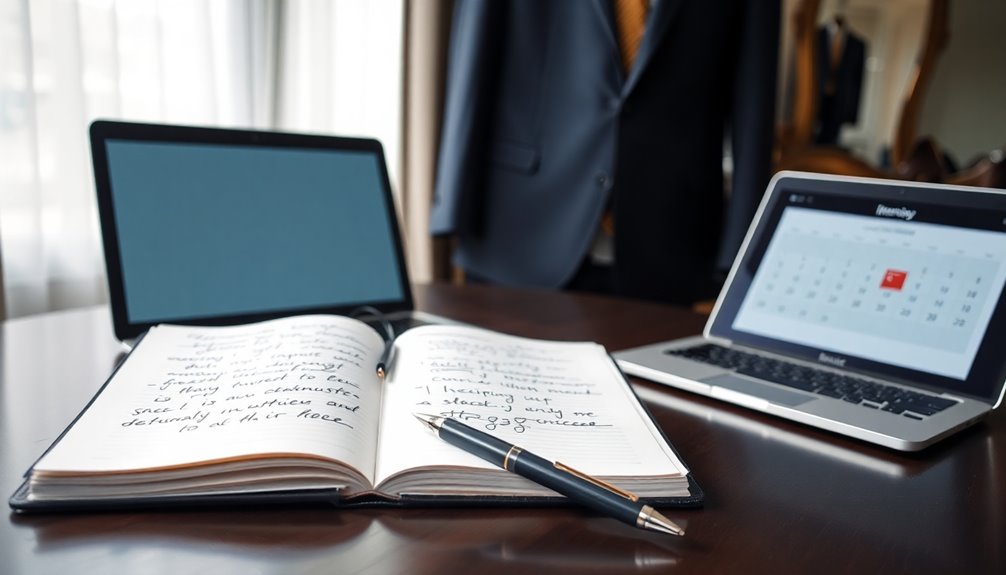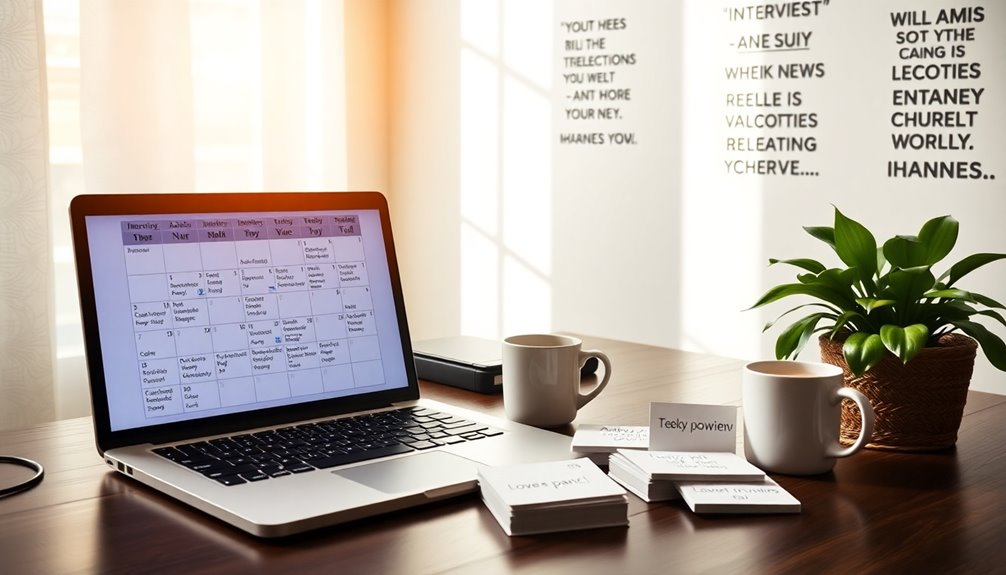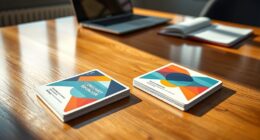To master in-person interviews, start by researching the company and the role to show your genuine interest. Practice common questions using the STAR method for clear responses. On the interview day, dress professionally and arrive early to settle in. Use the interviewer's name and engage in light conversation to establish rapport. Pay attention to your body language; smile, maintain eye contact, and listen actively. After the interview, send a thank-you email to express gratitude and reinforce your interest. These steps set you up for success, and there's much more to enhance your interview game ahead.
Key Takeaways
- Research the company and role thoroughly to tailor your responses and demonstrate genuine interest during the interview.
- Practice answering common interview questions using the STAR method to effectively showcase your experiences and skills.
- Dress professionally and plan your travel route in advance to ensure a punctual arrival and polished appearance.
- Engage with the interviewer using their name and maintain eye contact to create a positive and confident atmosphere.
- Follow up with a thank-you email to express gratitude and reinforce your interest in the position after the interview.
Understanding In-Person Interviews

What makes in-person interviews a critical step in the hiring process? They offer a unique opportunity for you and the employer to gauge compatibility.
Unlike phone interviews, in-person meetings allow for a deeper discussion about your experiences and how they align with the job requirements. You'll get to interact with the hiring manager face-to-face, which can reveal your personality and enthusiasm for the role.
Typically lasting between 30 minutes and several hours, these interviews may include multiple rounds, providing ample time for both parties to assess fit.
Additionally, you can observe the workplace culture firsthand, helping you decide if it's the right environment for you. This step is essential for making informed hiring decisions.
Preparation Strategies
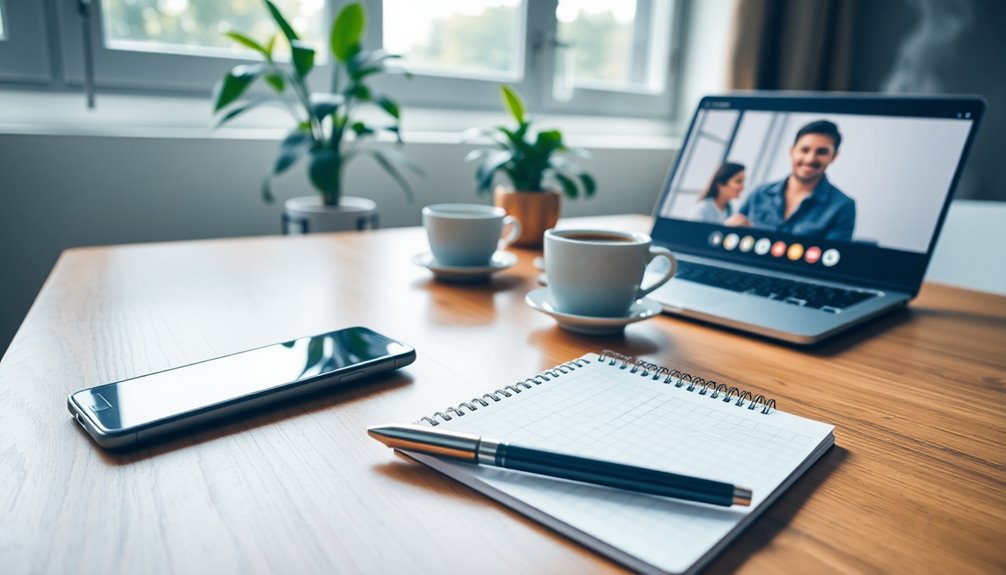
When preparing for an in-person interview, it's crucial to start early by gathering information about the company and the role. Research recent news and industry trends to show your awareness. Practice answering common questions using the STAR method to articulate your experiences effectively. Additionally, consider the potential emotional impact of the interview process, as it may evoke feelings of anxiety or stress.
Here's a quick table to help you organize your preparation:
| Preparation Task | Details |
|---|---|
| Research the Company | Learn about their culture and values |
| Practice Answers | Use the STAR method for clarity |
| Create Questions | Develop insightful queries for the interviewer |
Plan your attire carefully, ensuring it's professional and clean. Finally, map out your travel route to avoid any delays on the interview day.
Communication Techniques

Effective communication is key during in-person interviews, as it helps you convey your qualifications and fit for the role.
Pay attention to non-verbal cues; observe the interviewer's body language and adjust your responses based on their engagement.
Keep your comments professional, steering clear of negative remarks about past employers. Instead, focus on lessons learned and personal growth.
Use silence to your advantage—take a moment to reflect before responding, and don't hesitate to ask for clarification if needed.
Be mindful of your own body language; maintain eye contact and a confident posture to convey assurance.
Day-of Interview Tips
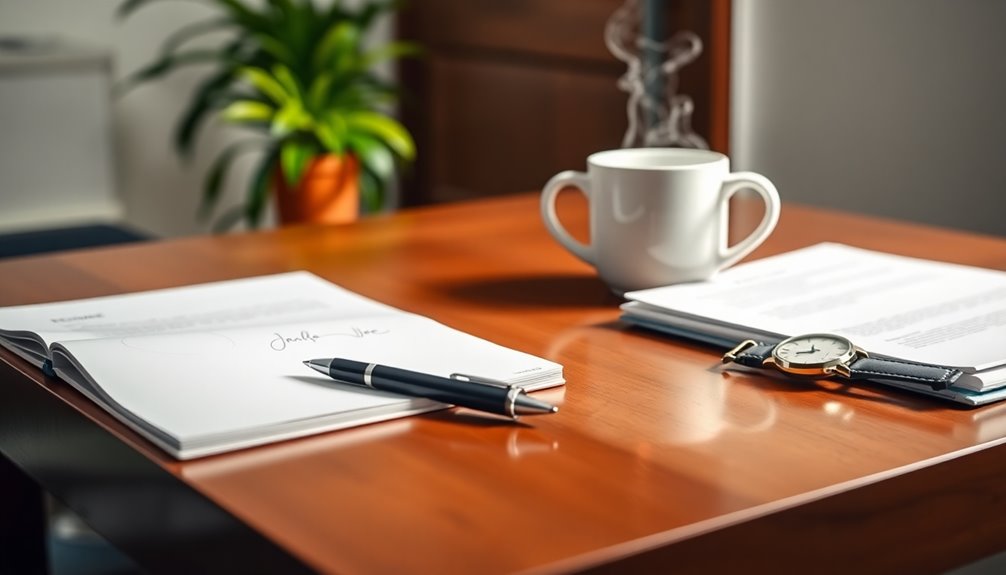
On the day of your interview, arriving early sets a positive tone and allows you to acclimate to the environment. Use this time to relax and mentally prepare.
Engage with the interviewer by using their name and maintaining light conversation; this builds rapport. Show enthusiasm through your body language—smile, maintain eye contact, and sit up straight.
Listen actively to the interviewer's cues and respond thoughtfully; this illustrates your interest and attentiveness. If you feel nervous, use relaxation techniques like deep breathing or positive affirmations to stay calm. Incorporating effective relaxation techniques can further enhance your ability to manage anxiety on the day of the interview.
Follow-Up Strategies

A timely follow-up can greatly enhance your chances of leaving a lasting impression after an interview.
It shows your professionalism and genuine interest in the role. Here are some key strategies to contemplate:
- Send a thank-you email: Express gratitude for the opportunity and reaffirm your enthusiasm for the position.
- Request feedback: If appropriate, ask for insights on your interview performance to improve for the future.
- Connect on LinkedIn: Stay engaged with the interviewer by connecting on professional networks, keeping the lines of communication open.
Frequently Asked Questions
What Should I Do if I'm Running Late for the Interview?
If you're running late for the interview, stay calm and assess your situation.
Contact the employer as soon as possible to inform them of your delay and provide an estimated arrival time. Apologize briefly but avoid over-explaining.
Once you arrive, take a moment to collect yourself before entering. Focus on making a positive impression despite the hiccup.
Can I Bring a Notebook or Portfolio to the Interview?
Yes, you can definitely bring a notebook or portfolio to the interview. It shows you're organized and prepared.
Use it to jot down important points or questions you want to ask. Just make sure it's neat and professional-looking. You don't want it to distract from the conversation, so keep it minimal.
Most importantly, be confident in your knowledge and experience, and let that shine through during your discussion with the interviewer.
How Should I Handle Unexpected Questions During the Interview?
How do you handle unexpected questions in an interview?
Stay calm and take a moment to think before responding. It's okay to ask for clarification or to rephrase the question to buy yourself time.
Use your experiences to illustrate your answer, focusing on relevant skills.
What if I Don't Know the Answer to a Question?
If you don't know the answer to a question, don't panic.
It's okay to admit you're unsure. You can say something like, "I'm not certain, but I can look into it." This shows honesty and a willingness to learn.
Alternatively, you might relate it to something similar you do know, demonstrating your thought process.
Just stay calm, and remember that interviews are about evaluating fit, not just knowledge.
Is It Appropriate to Follow up on Interview Feedback?
It's definitely appropriate to follow up on interview feedback.
After a week or so, you can send a polite email to express your continued interest in the position and inquire if there are any updates. This shows your enthusiasm and professionalism.
If they provide feedback, take it constructively to improve for future opportunities.
Just remember to keep your tone positive and respectful, as it reflects on your character.
Conclusion
By embracing these preparation tips, you'll walk into your in-person interview ready to make a lasting impression. Remember, it's not just about answering questions; it's about showcasing your unique fit for the role and connecting with the interviewer. Have you considered how your body language could convey confidence and enthusiasm? With the right mindset and strategies, you'll not only feel prepared but also stand out as a candidate who truly wants the job.
Eugene brings a fresh, dynamic voice to our platform as one of our talented Writers. Specializing in research-driven content, he explores the latest findings in psychology and personal growth, translating them into actionable insights for our readers. Eugene’s work is fueled by a curiosity about what makes us tick and a desire to help others unlock their potential.
